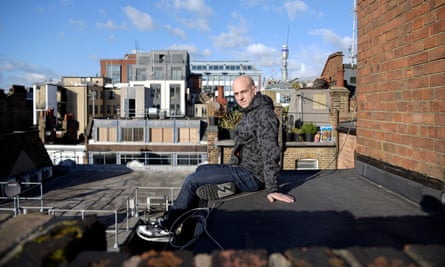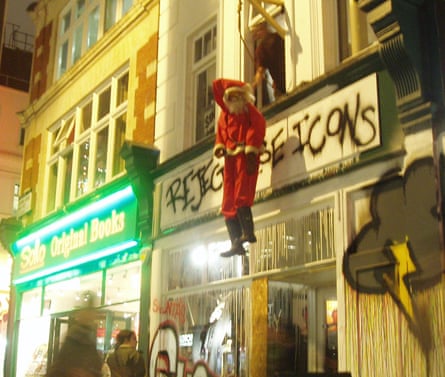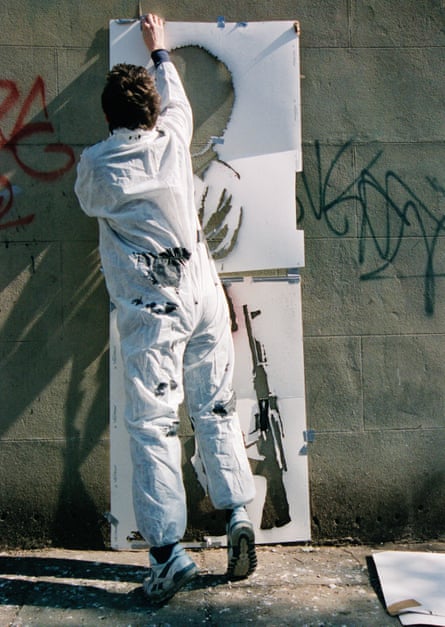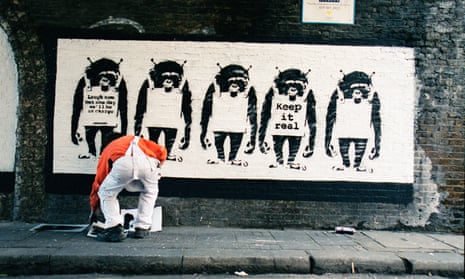One Christmas, Steve Lazarides and Banksy decided to kill Santa. “Reject false icons,” read the slogan hastily spray painted across their shopfront, behind a highly festive effigy they had created of Father Christmas dangling from a noose. Dotted around were signs intended to lure passersby into their shop, in the hope that they would join in the party and buy some artworks. The signs, however, may have had the opposite effect. “Santa’s Ghetto,” read one. “Stinking art piss,” read another.
“There were a few complaints about what we did to Santa,” says Lazarides, once Banksy’s right-hand man. “And about the noise. We didn’t care. It was a group show we did every year, so artists could make a little dough and punters could pick up some affordable art for Christmas stockings.”
Lazarides worked with Banksy for 11 rollercoaster years, initially documenting the artist at work back in 1997, then becoming his agent, strategist and even minder. The Christmas art shop had been rented from one of Soho’s last porn barons – but disaster struck. Liquid leaked through from the floor above, soaking an impromptu chandelier made of traffic cones. “I went to investigate,” says Lazarides. “It was a toilet overflowing. The crowd at the party thought it was part of the show. It wasn’t. It was literally stinking art piss.”

The art he and Banksy sold at Santa’s Ghetto was certainly affordable back in the noughties – but it could not be classified as such today. Lazarides recalls carrying armfuls of original Banksy prints to the shop, where they’d shift for £25. “At today’s rates,” he says, “I reckon each armful would be worth about half a million quid.”
One work, called Bomb Middle England, depicted three elderly women playing bowls with balls that had lit fuses coming out of them. In 2007, Sotheby’s sold a version of this image for £102,000, at the time the most ever fetched for a Banksy. It has since been eclipsed, with the title now held by the 2009 painting Devolved Parliament, which went for £8.5m earlier this year.
While Lazarides is happily reminiscing about the Santas of Christmases past, Banksy is on the streets of Birmingham making art about the scandals of Christmas present – in the form of his mural and video of two reindeer pulling, not Santa in his sleigh, but a homeless man called Ryan lying on a bench in the city’s jewellery quarter.
“How do you define greatest?” says Lazarides. “By money? No, by recognisability. And by that criterion, he is the greatest. Forget Warhol, forget everybody except Rembrandt and Van Gogh. He’s a genius.” As proof, he cites Girl With Balloon, the painting that shredded itself moments after being sold for more than £1m at Sotheby’s last year. (“Performance art of the highest order.”) And then there’s the union jack stab vest Banksy designed for Stormzy’s showstopping Glastonbury performance last summer.
Lazarides has now self-published a book of his photographs from the time he travelled the world tasked with making sure Banksy didn’t get arrested or duffed up and didn’t run out of spray paint. “I had the time of my life,” he says as he sits on the roof of his London office, talking about the man he calls Matey Boy. “We were lawless and did just what we wanted. Matey Boy had a political agenda that you can see very clearly in everything he does, but I just had a fucking blast.”
He met Banksy on an assignment for Sleaze Nation magazine, where Lazarides was a photographer. “I was from Bristol like him and loved graffiti art – it was for the dispossessed, those of us who didn’t go to galleries or have private educations. So it was a meeting of minds from day one.”

How come you two were never arrested? “The secret,” he says, “is hi-vis jackets and traffic cones. Nobody stops you if you have them.” However, there was a morning in New York’s Meatpacking District (“before it was gentrified”) when a few transgender sex workers took exception to Banksy painting a wall. “Some of them misconstrued what he was writing as homophobic and called the cops. That’s about as close to getting arrested as we got.”
He and Banksy had various scams to help them get away with things. “Once I gave him a letter saying he had permission from a film producer to paint a wall. And I would be the film producer, armed with a burner phone. If I got a call, I was primed to say, ‘Sorry mate, I meant him to do the other side of the street.’”
The book is called Banksy Captured and consists of Lazarides’ photographs of the art world’s favourite enigma at work, whittled down from his collection of 12,000. The book’s first edition of 5,000 copies sold out within days of publication, promoted through Lazarides’ website and Instagram. Orders were processed by his “fulfilment division”, meaning his mum and stepdad working in a Bristol warehouse. “She got made redundant from the chip shop, so this gives her another career.”

Now copies of the book are selling for up to £600 on eBay. A second edition is ready go and a follow-up volume will go on sale in the new year, this time featuring Banksy’s work in Los Angeles and beyond. “I might even do a third,” says Lazarides, “if I can find where the files on my hard drive have gone.”
Despite the title, Lazarides hasn’t actually captured Banksy himself, not 100% anyway. While the book certainly gives readers unprecedented access to the artist, we only ever see him from the rear or with a large red dot covering his face. Still, it is lovely to see art’s renegade-in-chief creating, for example, that urinating guard in his bearskin hat, not to mention the row of bib-wearing chimps. “Laugh now,” says the message on one bib, “but one day we’ll be in charge.”
Banksy has given Lazarides the go-ahead to publish these intimate images. But that brings us to the big question: who is Banksy? Bristol artist Robin Gunningham, Massive Attack’s Robert del Naja, Gorillaz founder Jamie Hewlett, a creative collective? “I’ll never give him up,” says Lazarides. “It’d be like telling a four-year-old Santa doesn’t exist. If he did reveal himself, no one would believe him. They’d be like, ‘Course you are, mate, course you are.’”
All of which makes it somewhat surprising to hear that Lazarides and Banksy don’t talk any more. Was there a falling out? “Not really. I’m bipolar and he’s obsessive. We’d gone as far as we could together. There is, I think, still a great mutual respect between us, though. There are texts, emails. We don’t talk because we don’t need to.”
Among the pictures in the book is a shot of London’s Hayward Gallery defaced with Banksy’s eloquent spray-painted comment: “Boring.” Lazarides says: “That sums up how we felt about the art world. My theory is that one of the reasons why he’s the world’s most famous artist is that he isn’t making people feel stupid, unlike most current art. I never got into art theory, never did a degree. And I never liked being told what I liked. So much art is about that snobbery.

“There are so many people working galleries who couldn’t give a fuck about art, who’re only in it for the money. I tested that theory recently in Hong Kong at a gallery I won’t name. I said to the guy, ‘Tell me about this painting.’ He said, ‘Well, it’s worth $6m.’ That’s the art world.”
In this, Lazarides is gamekeeper turned poacher. He opened his first gallery on Soho’s Greek Street in 2004, later expanding his empire with two other galleries nearby. The aim, he says, was to ensure street artists he admired didn’t get exploited by the art world. “Know what happened to the kids who invented tagging in the 70s? They got bought up by the white-bread downtown art world – and got fucked, turned into freak shows. I wanted to make sure it didn’t happen again.”
In this way, Lazarides turned Banksy into a bankable commodity for collectors and helped a whole new generation of street artists – Invader, JR, Vhils, the Miaz Brothers – to sell their work. Last year, he launched Lazinc in Mayfair with, reportedly, a seven-figure investment by Qatari billionaire Wissam Al Mana (the estranged husband of Janet Jackson).
How could street art be sold in Mayfair without losing its soul? When he was asked this last year, Lazarides denied that his artists sought to smash the system. “Even Banksy isn’t really anticapitalist,” he said. This September, though, he quit Lazinc, citing art world snobbery and saying: “I never wanted to sell fucking paintings. The only reason I did it was to promote a subculture that was being overlooked and is now gone.”
Where’s it gone? “There’s energy out there,” says Lazarides. “It just needs harnessing without snobbery and cynicism. I’m 50 now and a boring old fart. But I want to be knocked on my ass by some 20-year-old genius.” He thinks he can make that happen by getting out of Mayfair and working at it totally online, convinced that bricks-and-mortar commercial galleries have only five years left. “I’ve got no overheads. I can hit and run.”
He’s selling prints of his photographs on his website, with prices starting at £450. “Affordable art, like we did back in the day. I want to use this as a model for how to sell artists’ work. No third parties. Just me and the public. I can be an art world gangster again.”

Comments (…)
Sign in or create your Guardian account to join the discussion